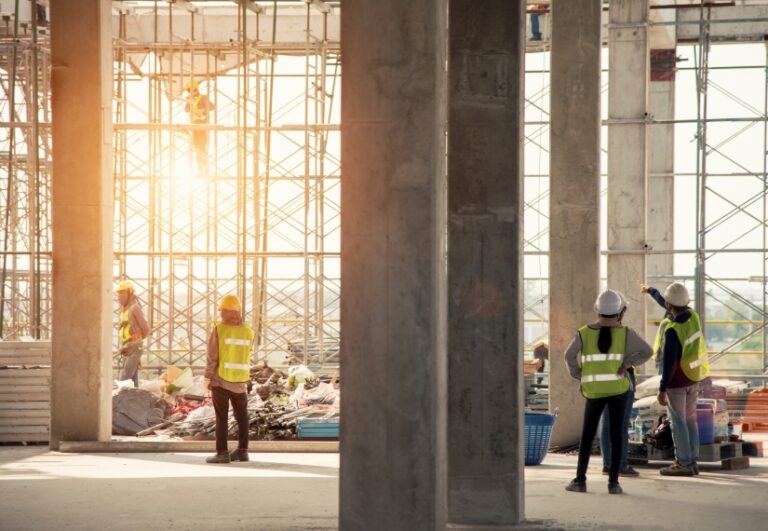As facilities age, weighing the benefits of a hospital remodel vs. new construction is crucial. Healthcare systems face numerous challenges as they consider their options. Skyrocketing costs, changing patient volumes and increased competition are just some of the concerns when choosing to build new healthcare facilities or renovate existing ones.
Let’s review all the factors hospitals need to balance. We’ll also look at how healthcare systems can evaluate their choices and why it’s important for your construction partners to have healthcare expertise.
New Hospital Construction Costs
Building a new hospital is expensive. The average healthcare construction cost per square foot in major cities ranges from $438 in Las Vegas to $773 in Los Angeles with Chicago coming in at $590.
Factors affecting these costs include facility type, size and location. A specialty clinic is typically more expensive than a general hospital, but larger facilities can take advantage of efficiencies of scale that aren’t available to smaller units. Costs in urban centers are usually higher than those in suburban or rural areas.
Hospitals also must consider architecture and design fees, as well as land acquisition and equipment costs. The cost of moving to a new hospital is another factor altogether.
The construction cost of a hospital remodel is generally lower than a new facility. But such estimates don’t include the cost of infection control or service interruptions, since hospitals usually must conduct renovations while remaining operational.
Hospital Renovation or New Healthcare Facility?
Construction costs are often the overriding concern when choosing between a new healthcare facility or hospital renovation. But healthcare systems should consider other factors as they make their decisions.
Condition of Existing Infrastructure
Infrastructure can include plumbing, heating and cooling systems, major mechanical equipment and data and electrical systems. Can the existing infrastructure support renovations? If the infrastructure needs to be updated, can the hospital’s current configuration accommodate modern technology? If the answer to either question is “no,” a new healthcare facility might be appropriate.
Availability of Space
Every hospital eventually needs to grow and adapt. Does the facility’s current location have enough space for expansion? If so, administrators may choose a hospital renovation. If there’s not enough room, building a new facility elsewhere may be best.
Location Suitability
Location is another concern when considering a healthcare facility remodel vs. new construction. Sometimes an existing site is close to key partners and institutions. In those cases, a healthcare facility renovation may make more sense. On the other hand, a different area might offer advantages like proximity to patients or major roadways. Building a new hospital might be the right choice in that case.
Timeline Constraints
New healthcare facilities take time to build. Zoning requests and other regulations also can extend the timeline for new construction. But a hospital remodel can usually be completed quicker. If timing is crucial, administrators may choose a hospital renovation.
Staff and Patient Safety
A renovation project presents specific challenges for hospitals that must remain operational. Dirt and debris from the remodel can be a source of infection. And navigating an active construction site can be dangerous for patients and staff. New hospitals could be a safer option.
Donor Participation
If a supporter donates land for a new facility, that could tip the decision against a hospital remodel. In other cases, a donor may want to fund an expansion or renovation instead of a new build. Administrators need to consider all funding options.

How To Decide Between a Hospital Remodel vs. New Construction
Healthcare systems must carefully weigh their options in choosing between a hospital remodel vs. new construction. Following these steps can help.
Gather Input From Your Staff
Who knows the needs of a hospital better than the people who work there every day? Get feedback from hospital leadership, department directors, physicians and nurses on what works and what doesn’t. This will provide valuable insights into whether a new healthcare facility or renovation makes more sense. As a bonus, involving staff can boost team morale.
Conduct a Comparative Assessment
Look beyond our own hospital’s situation. What have similarly sized facilities in similar geographic areas done? How well did their solutions work? Would these healthcare systems have done anything differently? Their choices can help you decide on a hospital remodel vs. new construction.
Run Department Tests
Check each service area and department. See if they have the necessary square feet to run properly. Can a hospital renovation provide adequate room for staff activities and patient flow? Use these calculations as a foundation for your decision. Rely on a design and construction firm that is well-versed in the healthcare sector to help with these analyses.
Survey Your Community
A healthcare campus is an essential resource for the local community. Input from community members can inform the investment you make. Your community can provide crucial feedback on everything from the services you’ll offer to the layout and design of your facility. Incorporating community input can help improve patient outcomes and community well being. It can also boost local support for your project.
Trust Pointcore’s Construction Services
Whether you choose a hospital remodel or new construction, that decision begins a crucial process. Generic construction firms don’t have the experience to help. But Pointcore construction services come with extensive healthcare construction expertise as construction professionals exclusively focused on healthcare. We understand your concerns. And we provide guidance that ensures your project’s success. Our calling is to join forces with you to transform healthcare practices, save lives and improve our communities’ well being. Pointcore offers design-build services, owner representation, master facility planning and more. Contact us today to see what we can do for you.

